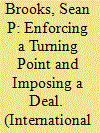| Srl | Item |
| 1 |
ID:
084355


|
|
|
|
|
| Publication |
2008.
|
| Summary/Abstract |
Low expectations and international impatience forced the African Union to shift from a classical integrative approach to negotiations to "deadline diplomacy" during the final months of the Abuja talks between the Sudanese government and the Darfur rebel movements. As a result, the AU mediators - who had served as communicators and formulators - assumed the responsibility of manipulators. This transition scuttled plans for gradually arriving at the implementing details for a formula. Instead, acquiescence to power served as the chief reason for the signature of one of the movements, while the mediators showed disinterest and inflexibility in reigning in the other two movements that required a package of additional threats and inducements. Important lessons regarding the credibility of deadlines, the appropriateness of the formula, the necessity of ownership, inclusivity/exclusivity of the talks, and sufficient support for the movements in the prenegotiation and diagnosis phases can be drawn from the Abuja process.
|
|
|
|
|
|
|
|
|
|
|
|
|
|
|
|
| 2 |
ID:
107966


|
|
|
|
|
| Publication |
2011.
|
| Summary/Abstract |
This article explores the impact of time pressure on negotiation processes in territorial conflicts in the post-cold war era. While it is often argued that time pressure can help generate positive momentum in peace negotiations and help break deadlocks, extensive literature also suggests that perceived time shortage can have a negative impact on the cognitive processes involved in complex, intercultural negotiations. The analysis explores these hypotheses through a comparison of sixty-eight episodes of negotiation using fuzzy-set logic, a form of qualitative comparative analysis (QCA). The conclusions confirm that time pressure can, in certain circumstances, be associated with broad agreements but also that only low levels of time pressure or its absence are associated with durable settlements. The analysis also suggests that the negative effect of time pressure on negotiations is particularly relevant in the presence of complex decision making and when a broad range of debated issues is at stake.
|
|
|
|
|
|
|
|
|
|
|
|
|
|
|
|